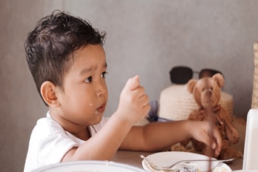At seven months, babies undergo remarkable developmental milestones. They often display enhanced mobility, some might start crawling or scooting, while others might be close to achieving these milestones. Object permanence becomes more apparent, as infants understand that objects still exist even when out of sight. Many babies at this stage are actively exploring their surroundings, grabbing and inspecting objects with growing curiosity. Some may even start pulling themselves up to a standing position, showcasing emerging strength. The introduction of solid foods is common around this time, marking a shift in their nutritional intake. As always, individual development varies, and consulting with a pediatrician ensures tailored guidance for your baby’s unique journey.
Table of Contents
ToggleWhat are the Baby’s Development and Milestones on the 7th Month
Physical Development
- Babies at this age may start to crawl, roll over, or shuffle
- They can support some weight on their legs and enjoy bouncing up and down
- Teething symptoms may persist, with increased drooling and a desire to chew on objects for relief
Cognitive Development
- Babies’ memory improves, and they may look for items when they are covered or dropped on the floor
- They also show interest in jack-in-the-box or pop-up books with familiar stories
Social Development
- Babies may begin to miss their caregivers when they are gone, which can lead to separation anxiety
Communication Development
- Babies may start to make two-syllable sounds, such as “mama” or “dada.” They may also use facial expressions like frowning
- Your baby may begin to respond to their name, indicating growing recognition
Feeding
- Babies continue to eat 4-6 times a day, with solid food feedings increasing in frequency
- Some babies are ready for a variety of soft, mashed foods. Consult with your pediatrician for appropriate options
Sleeping
- Babies at this age may sleep for around 14-15 hours per day, with 10-11 hours at night and 3-4 hours during the day
What are the activities needed to Support your 7-month-old baby’s development
Peekaboo with a mirror
- This game helps develop a baby’s cognitive skills, such as object permanence
Place items just out of reach
- This encourages a baby to reach and grasp for objects, which helps develop their fine motor skills
Hand-eye Coordination Activities
- Blow bubbles. This activity can help develop a baby’s visual tracking and hand-eye coordination
- Ball bath. This activity can help develop a baby’s sensory skills and hand-eye coordination
- Clapping together can help develop a baby’s hand-eye coordination and fine motor skills
Crawling games
- Crawling games can help build a baby’s strength, and coordination, and encourage them to move around in different directions
Singing nursery rhymes
- Singing nursery rhymes can help a baby learn another language and promote language development and coordination
Outdoor exploration
- Exploring different outdoor areas can enrich a baby’s experiences and allow them to use all their senses, playing with grass, sand, and mud
Messy play
- Messy play with baby-safe paint can help develop a baby’s body awareness, hand-eye coordination, and tactile sense
Driving with your baby
- Driving with your baby can help develop their visual tracking and sensory skills
How to Feed Your 7-Month-Old Baby
Breastfeeding or Formula
- Continue breastfeeding or offering formula as the primary source of nutrition. Ensure adequate milk intake for overall health
Introduction of Solid Foods
- Begin introducing single-ingredient iron-rich baby cereals, such as rice or oatmeal, mixed with breast milk or formula. Start with a small spoonful and gradually increase
Vegetables and Fruits
- Introduce pureed or mashed vegetables and fruits. Begin with mild options like sweet potatoes, peas, apples, or bananas. Offer a variety to expose your baby to different tastes
Protein Intake
- Include pureed meats, such as chicken or turkey, to provide essential proteins and iron. Ensure the texture is suitable for your baby’s developmental stage
Finger Foods
- Introduce soft finger foods like small pieces of well-cooked vegetables, fruits, or mild cheese. This encourages self-feeding and improves fine motor skills
Yogurt and Cheese
- Offer plain, full-fat yogurt and small amounts of mild cheese. These provide calcium and healthy fats important for growth
Avoid Certain Foods
- Avoid introducing honey, cow’s milk as a main drink, and foods that pose choking hazards, such as whole grapes or nuts.
How Much Sleep Does Your 7-Month-Old Baby Need
Nighttime Sleep
- Your baby should aim for around 10 to 11 hours of uninterrupted nighttime sleep
- Establish a consistent bedtime routine to signal that it’s time for sleep. This may include activities like a warm bath, reading a short story, or gentle rocking
Daytime Naps
- Typically, your 7-month-old will need 2 to 3 naps during the day
- Each nap may last anywhere from 1 to 2 hours, with the total daytime sleep ranging from 3 to 4 hours
Nap Schedule
- Establish a consistent nap schedule, aiming for morning, afternoon, and possibly a short evening nap. This helps regulate your baby’s sleep patterns
Teething and Disruptions
- Teething and developmental milestones can sometimes disrupt sleep. Be patient and provide comfort as needed
Day in the Life of a 7-Month-Old Baby
Feeding
- Baby’s feeding schedule typically involves 4-6 feedings of breast milk or formula per day
- Each feeding consists of about 6-8 ounces of formula or breast milk
- 1-2 solid meals per day
- Each meal consists of 1-6 tablespoons of purees or finger foods
Sleeping
- 12-16 hours a day
- Daytime sleep is now about 3-4 hours
- 2-3 naps per day
- Night sleep for 9 hours or longer
Bathing
- Babies need a bath about 3 times a week
- Focus on washing the face, neck, and diaper area
- Singing songs, using gentle movements, and playing with bath toys can make the experience enjoyable for your baby
Changing Diapers
- Baby typically needs to be changed every 2-3 hours, or about 5-6 diapers a day
- It’s essential to change the diaper as soon as it is wet or soiled
Playing
- ing nursery rhymes or interactive songs. Include hand movements or simple dances to make it an engaging experience
- Use a baby-safe mirror for your baby to see their reflection. This can be intriguing and aids in self-recognition
- Introduce sensory play with items like a soft brush for gentle skin stimulation or a crinkly fabric for auditory exploration
Fun Facts
- Your baby might greet the morning with adorable coos and babbling, showcasing their developing vocal skills
- If teething is underway, your baby might enjoy gnawing on teething toys or experiencing relief from chilled teething rings
Baby’s Health at 7-Month-Old
Hygiene Practices
- Continue with good diapering and hygiene practices. Use baby-friendly wipes and creams to prevent diaper rash.
- Establish a routine for bathing, ensuring water temperature is safe, and using mild baby-friendly products.
Physical Development
- Encourage tummy time to strengthen neck and upper body muscles.
- Support your baby’s attempts at sitting independently, crawling, or other emerging motor skills.
Common Health Concerns
- Teething Discomfort. Teething discomfort is common around this age. Babies may experience irritability, drooling, and a desire to chew on objects. Provide safe teething toys for relief.
- Ear Infections. Ear infections can occur due to the anatomy of a baby’s ear. Watch for signs like tugging at the ears, fussiness, and difficulty sleeping. Consult with a healthcare professional if you suspect an ear infection.
- Colds and Respiratory Infections. Exposure to viruses can lead to colds or respiratory infections. Symptoms may include a runny nose, coughing, and mild congestion. Ensure your baby stays hydrated and consult with your pediatrician if symptoms persist.
- Constipation. Changes in diet or the introduction of new foods can sometimes lead to constipation. Ensure your baby stays hydrated and incorporates fiber-rich foods. Consult with your pediatrician if constipation persists.
- Gastrointestinal Upset. An upset stomach or gas can be common as your baby’s digestive system continues to develop. Burping your baby after feeding and using proper feeding techniques can help alleviate discomfort.
- Allergies. The introduction of new foods increases the risk of allergies. Watch for signs of allergic reactions such as hives, swelling, or breathing difficulties. Introduce new foods one at a time and monitor your baby closely.
- Reflux. Gastroesophageal reflux (GER) is common in infants. Symptoms include spitting up after feeds. Ensure your baby is positioned upright after feeds and consult with your pediatrician if reflux is causing discomfort.
- Crawling and Bumps. As babies start crawling, bumps and bruises become more common. Baby-proof your home and provide a safe environment to minimize the risk of injuries.
- Eye Infections. Eye infections, such as conjunctivitis, can occur. If you notice redness, discharge, or swelling, consult with a healthcare professional for appropriate treatment.
- Vaccination Side Effects. After vaccinations, some babies may experience mild side effects like low-grade fever or fussiness. These usually subside within a day or two. Consult with your pediatrician if you have concerns.
Social and Emotional Development
- Engage in interactive play and provide opportunities for social interaction with family members and caregivers.
- Respond to your baby’s babbling and attempts at communication. This strengthens the parent-child bond.
Immunizations
- Keep up with the recommended immunization schedule as advised by your pediatrician. Vaccines are crucial for protecting your baby from preventable diseases.
Items Needed on the 7th Month of Your Baby
Feeding Essentials
- Continued supply of formula or breastfeeding essentials.
- Introduction of soft, mashed solids or baby-led weaning foods.
Feeding Gear
- Baby-friendly utensils, bowls, and plates.
- High chair or booster seat for meals.
Bibs and Burp Cloths
- Waterproof bibs to manage mealtime mess.
- Soft burp cloths for post-feeding cleanups.
Developmental Toys
- Toys that encourage crawling, grasping, and sensory exploration.
- Stacking toys and building blocks for fine motor skills.
Teething Aids
- Teething toys or rings to soothe sore gums.
- Baby-safe teething gel or remedies.
Babyproofing Supplies
- Safety gates to restrict access to certain areas.
- Outlet covers and cabinet locks to ensure a safe environment.
Diapers and Wipes
- Adequate supply of diapers in the appropriate size.
- Gentle baby wipes for diaper changes.
Clothing
- Comfortable clothing suitable for the changing weather.
- Sleepsuits or footed pajamas for bedtime.
Sleep Essentials
- Crib or playpen for a safe sleep space.
- Soft blankets and sleep sacks for comfort.
Life as a Parent on Baby’s 7th Month
Becoming a parent is a transformative experience, and each month brings new challenges and joys. The 7th month is a pivotal stage in your baby’s development.
Understanding Development Milestones
Witness the marvels of your baby’s growth during the 7th month. From motor skills to cognitive abilities, every milestone is a testament to their rapid development.
Navigating Sleep Challenges
Addressing sleep regression and establishing a bedtime routine for both you and your baby ensures a restful night’s sleep.
Juggling Responsibilities
Balancing work, family, and personal time becomes an art during this phase. Learn effective strategies to manage your responsibilities while cherishing precious moments.
Building a Strong Parent-Child Bond
Explore activities and interactions that foster a deep connection with your baby. Building a strong bond is not only heartwarming but crucial for their emotional well-being.
Last Updated on January 15, 2024
Written By
With a solid foundation in family dynamics, child development, and a knack for assessing products, our content is built on a strong grasp of our topics. We use trustworthy sources, seek advice from experts, and stay current with the latest happenings in our fields. We always give credit to our sources, reveal any possible conflicts of interest, and deliver info in a truthful and unbiased way. Follow us on Facebook or join our Facebook Group.
Start your journey to confident parenting
Join over 2,000+ parents who receive free practical advice and tips from Joyful PH. Unsubscribe anytime.
You may also like
Toddler’s Development and Milestones at 24th Month
A two-year-old's growth and achievements at 24 months are remarkable. Toddlers…
Toddler’s Development and Milestones at 23rd Month
In the 23rd month, toddlers exhibit significant developmental strides. Their…
Toddler’s Development and Milestones at 22nd Month
At 22 months, toddlers make strides in independence, speech, and motor skills.…
Toddler’s Development and Milestones at 21st Month
During the 21st month, toddlers continue their dynamic development. Language…
Toddler’s Development and Milestones at 20th Month
At 20 months, toddlers exhibit remarkable progress. Their language skills…
Toddler’s Development and Milestones at 19th Month
A toddler at 19 months undergoes significant development. Language skills…







